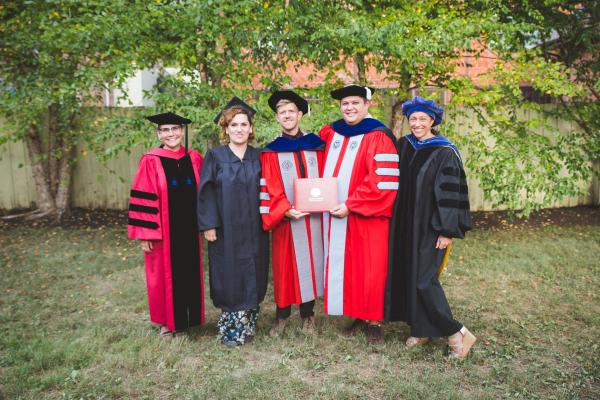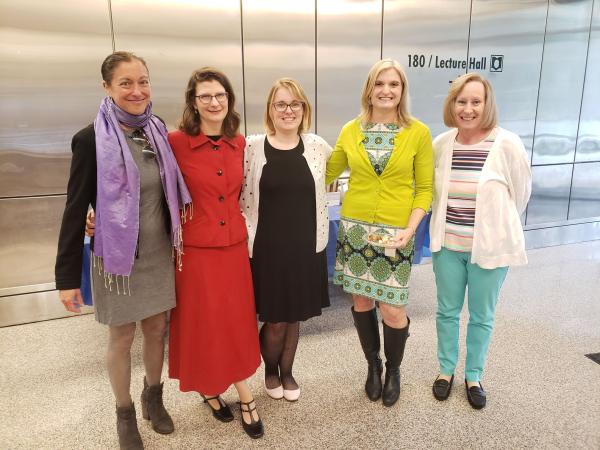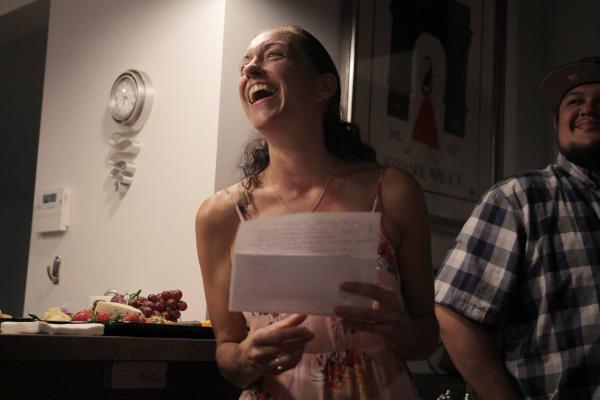As you may have heard, Dana Renga, Department Chair of FRIT and Professor of Italian, will be finishing her term as chair this summer and taking on the role of Divisional Dean of Arts and Humanities within the College of Arts and Sciences.
I think I speak for everyone in FRIT when I say that Renga has fostered a highly productive, inclusive, and collaborative environment in the department, and that students, faculty, associated faculty, and staff alike have benefitted from it. We are grateful for this and we are very excited to see Renga in her new role!
To shed more light on her time as Chair and her new role, Renga talked about her proudest moments, challenges, and goals.

What have been your proudest achievements during your time in FRIT?
One of my proudest achievements is establishing the FRIT Diversity, Equity, Inclusion, and Anti-Racism Committee. We are one of the first departments in the college to do this and it has really improved our unit’s culture. We have taken big strides in making sure all department members feel comfortable and included, and we are committed to continuing this incredibly important work.
We have also created more professionalization and mentoring opportunities for our associated faculty. We have been able to provide more long and stable contracts. The new Associated Faculty Committee ensures better mentoring and a better culture. This is very important as associate faculty are critical to our department’s mission and often the first point of entry to the majors.
I joke that I was fortunate enough to become chair at the worst time – when the department was going through an external review. Actually, the process produced massive opportunities to look at our curricula critically. Since then, we have added three undergraduate majors as well as the BA/MA, and faculty have more opportunities to offer courses they are passionate about and that are engaging to students. As a result, the curricula have become much more welcoming and engaging to our increasingly diverse student body.
One of the things that has constantly made my job exciting, fun, and positive is our staff. Our staff are amazing, and it is a moment of pride just because we have such a wonderful team.
I am also very proud of how we got through the pandemic as a department. One of our big goals at the onset was to make sure that we could give contracts to all associated faculty. We had to make some sacrifices, but we made it happen. In general, because of our value of transparency, and because everyone was committed, we got through super well.
All these things were accomplished collaboratively, it was not just me. As a department, we have been committed and transparent, and we have been able to do so much.

What have been some of the biggest challenges?
That is an easy one – the pandemic. You can only be so prepared for something like this, everyone had to step up a lot. All the chairs had to step up so much. As a small silver lining, though, everyone came together, units collaborated and got to know each other better than before.
During my second year as chair, the chairs of the language departments worked together to come up with a consortium that showed that we are more impactful and efficient as separate units than if we were combined as one. This was a difficult task, but we succeeded, and we were also able to increase collaboration on some important initiatives, such as the Practice of the Profession Series.
Another challenging moment was realizing the sheer size of the job of chair at the very beginning. I attended “chair boot camp” along with all new chairs that year. It lasted for a full two days, and it was incredibly overwhelming. However, a couple weeks later I realized that this was an amazing job, even a vocation for me.
Had you thought about serving as chair before the opportunity presented itself?
I originally agreed to be chair because it was a good move for me career-wise, and because I believe in shared governance. I did not realize how much I would love the job. Between the support network I had among other chair and unit heads in the university, and the commitment that our department showed to advancing, I have found this job to be very enjoyable and fulfilling.
What are some exciting changes that you expect to see at FRIT in the near future?
I am excited for people to experience our space and the #FRITmeans campaign when we get back to campus. We introduced the campaign into our main office space and hallways not long before the pandemic started, and now everyone can experience it when they visit the department.
Another great new opportunity is the Professor of Teaching track, which will recognize and provide a career path to a few of our associated faculty.
We are also seeing a gradual increase in our graduate student pool, and this is only going to grow. It is exciting that we are seeing more international students, and more diverse students. Similarly, among undergraduate students, our newly created or improved curricula are welcoming an increasingly diverse student pool to our classes and degrees.
These exciting changes are a result of many things, including the work of the Diversity, Equity, Inclusion, and Anti-Racism Committee, the dedication of faculty to the curricula, and the engaging messaging of the department.

Was serving as Dean always a goal of yours?
Yes, I have always wanted this job. A few years into my chair term, I started thinking that I would be good at it too. As Divisional Dean at a large institution you can affect the future of higher education and bring positive change to so many people’s lives.
What are you most excited about as you take on your role as dean?
I look forward to getting to know all the departments in our division, their curricula and priorities.
I am looking forward to working collaboratively to see through the completion of the new Arts District. It will serve as the new front door of OSU, highlight the arts, and bring so many community partners to the university.
I am very excited to work with President Johnson and to support the central role that arts and humanities play in many of her initiatives, such as the anti-racism initiative. I am also excited to partner with Jared Gardner and others, who is working on the future of the Humanities Institute.
What parts of your role as chair have most prepared you to serve as dean?
This is boring, but true – relying on data to make well-informed persuasive arguments. Positive change does not happen automatically, it takes data driven decision making, time, transparency, and communication. When people see something as a common good, they know they will benefit from it with time even if it does not align with one of their goals immediately.
It is also amazing to have had the ability to work with so many great people in our department, and to know that the same spirit of collegiality is present in the dean’s office. This makes it exciting to show up to work every day.
Describe your term as chair in three words.
Inclusive, collaborative, forward-thinking.
